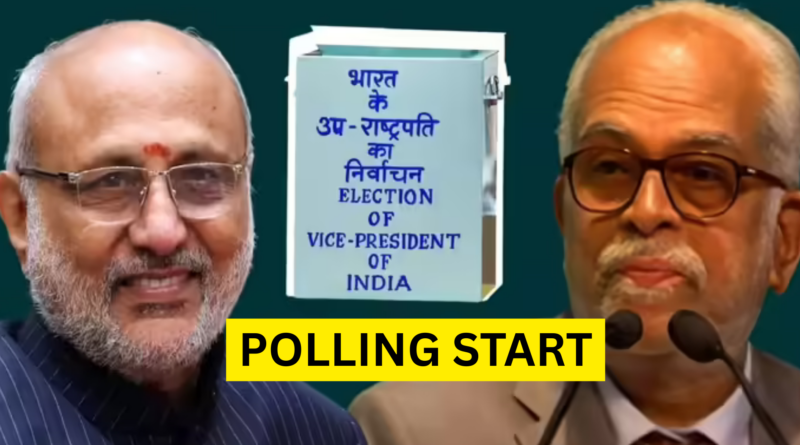VICE-PRESIDENT ELECTION 2025: WHO WILL WIN THE PRESTIGIOUS POST?
The polling for the 15th Vice-President of India began at 10 am in the Parliament House today. The atmosphere inside the Parliament was filled with seriousness and excitement as Members of Parliament (MPs) lined up to cast their votes. The Vice-President of India is the second-highest constitutional post in the country after the President, and the position also comes with the important responsibility of being the Chairman of the Rajya Sabha. This makes the election very significant in Indian politics.
Prime Minister Narendra Modi was among the first leaders to cast his vote. After that, ministers, MPs from different political parties, and independent members slowly joined the voting process. Both the ruling National Democratic Alliance (NDA) and the opposition parties are keeping a close watch on the voting numbers. Even though the NDA candidate is considered to have a majority, the opposition has put forward a strong challenge, making the contest interesting.
Importance of the Vice-President’s Post
The Vice-President of India holds a very important role in the functioning of Parliament. As the Chairman of the Rajya Sabha, the Vice-President makes sure that debates and discussions are conducted in an orderly manner. The person holding this office is expected to remain neutral and allow all voices to be heard, whether from the ruling side or the opposition. This post also becomes crucial whenever there is tension between the government and opposition inside the Upper House.
Apart from this, the Vice-President is also the second citizen of the country, after the President. In case of any emergency where the President is unable to perform his or her duties, the Vice-President may take over temporarily. Hence, the election of the Vice-President is not just a formality but a decision that impacts the working of Indian democracy.
The Election Process
Only Members of Parliament from both the Lok Sabha (House of the People) and the Rajya Sabha (Council of States) take part in the Vice-Presidential election. Unlike the Presidential election, state assemblies do not participate in this process. The voting takes place through a secret ballot, meaning MPs cast their votes privately and no one knows who voted for whom. This system ensures freedom of choice for all MPs.
The Election Commission has made all necessary arrangements for smooth voting. Ballot boxes have been placed in the Parliament House, and MPs are coming in batches to cast their votes. Once the voting ends, the sealed ballot boxes will be opened, and the counting will begin at 6 pm today. The results are expected to be announced in the evening itself.
Candidates and Contest
The NDA has nominated its candidate with the confidence of a majority. Since the NDA enjoys strong numbers in the Lok Sabha and has reasonable support in the Rajya Sabha, its candidate is considered the favorite. However, the opposition alliance has put forward its own candidate to make the contest meaningful. Leaders of the opposition are hoping that some independent MPs and smaller parties may support their side, which could improve their chances.
This contest is not just about numbers but also about sending a political message. If the NDA wins with a large margin, it will show the strength of the ruling alliance. On the other hand, if the opposition manages to get significant votes, it will highlight their unity and growing influence in Parliament.
The Role of Political Strategy
Behind the scenes, both the NDA and opposition leaders have been busy campaigning and requesting support from MPs. Meetings were held, strategies were planned, and political negotiations were made to ensure every vote counts. In such elections, even a small shift in numbers can create headlines. Therefore, both sides are being extremely cautious.
Prime Minister Narendra Modi, Home Minister Amit Shah, and other senior NDA leaders have been confident about victory. Meanwhile, opposition leaders have been urging MPs to “vote with their conscience” and show the power of democracy.
What Happens After the Result?
Once the results are declared, the newly elected Vice-President will take an oath of office and officially begin his or her five-year term. The person will immediately assume the role of Chairman of the Rajya Sabha. The coming session of Parliament will therefore be the first big test for the new Vice-President, as they will have to handle debates, pass bills, and maintain peace in the House.
The election of the Vice-President also reflects the current balance of power in Indian politics. It shows which alliance is stronger inside Parliament and also sets the tone for future political battles, including upcoming general elections.
Conclusion
The election of the 15th Vice-President of India is being closely watched not just by politicians but also by citizens across the country. While the NDA candidate is widely expected to
win because of the ruling party’s numerical strength, the opposition has ensured that the contest remains engaging. The real excitement lies in the vote counting, which begins at 6 pm today.
By tonight, India will know who will hold the second-highest constitutional office and guide the Rajya Sabha for the next five years. Until then, the nation waits with curiosity and anticipation.




